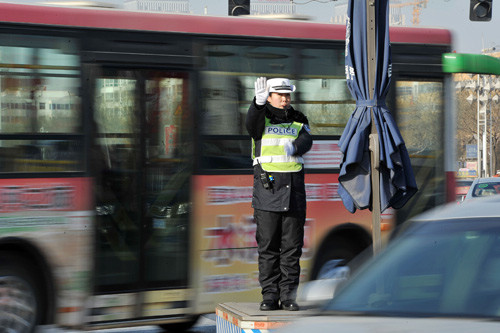|
 |
|
UNDER CONTROL: A policewoman directs traffic at an intersection in Yinchuan, northwest China's Ningxia Hui Autonomous Region, as China's revised traffic regulations impose harsher penalties from January 1, 2013 (PENG ZHAOZHI) |
Internet Regulation
The Standing Committee of the National People's Congress, China's top legislature, adopted legally binding regulations to strengthen online information protection on December 28, 2012.
The decision is meant to ensure information security, protect citizens' lawful rights, and safeguard national security interests. Among the 12 articles is an identity management policy requiring Internet users to use their real names to identify themselves to service providers.
According to the regulation, "Network service providers will ask users to provide genuine identification information when signing agreements to grant them access to the Internet, fixed-line telephone or mobile telecommunication services or to allow users to post information publicly."
Air Quality Data
The China National Environmental Monitoring Center released air quality data including intensity of fine particulate matter less than 2.5-micron diameter (PM2.5) on New Year's Day.
On January 1, 2013, 496 sites in 74 major Chinese cities began monitoring PM2.5 data. Information on particulate matter in China used to be limited to particulate matter 10 microns or less in diameter.
Live air quality data are provided at the center's website, www.cnemc.cn. A mobile phone application is also available.
China's urban air quality monitoring will proceed in stages, with all prefecture-level cities slated to begin PM2.5 monitoring by 2016.
Tariff Exemptions
The Economic Cooperation Framework Agreement (ECFA) provided tariff-free treatment to an additional 14 types of mainland goods and 30 products from Taiwan, as the third stage of tariff exemptions took effect under the Early Harvest Program on January 1, 2013.
A total of 806 items—539 mainland goods and 267 products from Taiwan—have been designated for tariff-free treatment since 2011.
Implemented two years ago, the program is designed to allow people on both sides of the Taiwan Straits to enjoy the boons of the ECFA before the full liberalization of mainland-Taiwan economic ties.
Signed in June 2010, the ECFA is a preferential trade deal to reduce tariffs and commercial barriers.
From January 2011 to October 2012, the program has exempted Taiwan's businesses from $551 million in tariffs, according to Xinhua News Agency.
| 